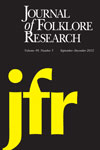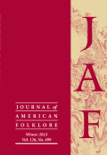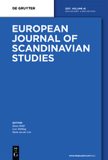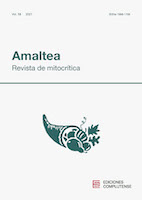
Milli Folklor
metrics 2024
Exploring the Rich Tapestry of Culture and Tradition
Introduction
Milli Folklor, published by GELENEKSEL YAYINCILIK LTD STL, stands as a significant platform for scholarly discourse in the fields of Arts and Humanities and Cultural Studies, with an ISSN of 1300-3984 and E-ISSN 2146-8087. As a prominent Turkish journal, it has been actively contributing to the academic community since its inception in 2002, and it is set to converge its publishing journey through to 2024. With a commendable Q2 category ranking in both the Arts and Humanities (miscellaneous) and Cultural Studies categories, the journal reflects a solid standing within the academic landscape, sitting in the 40th percentile for general arts and humanities and the 34th percentile in social sciences. Milli Folklor emphasizes the exploration and preservation of folkloric traditions, cultural practices, and societal narratives—facilitating interdisciplinary research that transcends national boundaries. Although primarily a print journal, the insights shared in its pages serve as invaluable resources for researchers, professionals, and students alike who seek to deepen their understanding of cultural phenomena. The journal aims to enrich scholarly discussions while broadening readers' perspectives on the intricate tapestry of culture and society.
Metrics 2024
 0.23
0.23 0.10
0.10 0.10
0.10 12
12Metrics History
Rank 2024
Scopus
JCI (Web Of Science)
Quartile History
Similar Journals

Slavia-Casopis pro Slovanskou Filologii
Cultivating Knowledge in the Heart of Slavic PhilologySlavia-Casopis pro Slovanskou Filologii is an esteemed journal dedicated to the advancement of Slavic philology, published by the SLOVANSKY USTAV AKAD CESKE REPUBLIKY in the heart of the Czech Republic. With its ISSN: 0037-6736, the journal serves as a vital platform for scholarly exchange, embracing a rich academic tradition since its convergence years beginning in 2002. The journal has achieved notable recognition, with a Q3 ranking in Linguistics and Language and a Q2 in Literature and Literary Theory as of 2023, highlighting its contribution to these dynamic fields. Although it does not currently offer open access, its rigorous selection of articles ensures that it remains a crucial resource for researchers and practitioners alike, facilitating a deeper understanding of Slavic languages and literature. Scholars benefit from the journal's extensive research backdrop, enhanced by its current ranks in the Scopus database, underscoring its significant placement within the academic literature landscape. The editorial scope of Slavia promotes innovative inquiries that reflect cultural, historical, and theoretical perspectives endemic to Slavic studies, making it indispensable for professionals, students, and enthusiasts invested in the exploration of Slavic linguistic and literary heritage.

Sibirskii Filologicheskii Zhurnal
Exploring Cultural Narratives Through Scholarly InsightSibirskii Filologicheskii Zhurnal is a prestigious academic journal published by the Russian Academy of Sciences, Institute of Cytology and Genetics. With ISSN 1813-7083, it is dedicated to advancing research in the fields of Cultural Studies, Linguistics and Language, and Literature and Literary Theory, and has achieved notable rankings, including Q2 in Cultural Studies and Linguistics, and Q1 in Literature for 2023. The journal provides a platform for scholarly discourse, contributing valuable insights to its fields with an evolving scope that spans from 2018 to 2024. Though not an open-access journal, Sibirskii Filologicheskii Zhurnal serves as a vital resource for researchers, professionals, and students in the Russian Federation and beyond, fostering a deeper understanding of linguistic and literary phenomena. Its commitment to high-quality content makes it an essential addition to any academic's library.

JOURNAL OF FOLKLORE RESEARCH
Celebrating the Voices of Folklore and MusicJOURNAL OF FOLKLORE RESEARCH, published by Indiana University Press, serves as a vital platform for scholarly exploration within the realms of folklore, cultural studies, and music. With an ISSN of 0737-7037 and an E-ISSN of 1543-0413, this journal has converged its content from 2002 to 2024, facilitating a dynamic discourse on the interplay of traditional narratives and contemporary cultural forms. Despite its current tier in the Q4 category for both Cultural Studies and Music, the journal is increasingly recognized for its contributions, ranking 69th in Music and 526th in Cultural Studies as per the latest Scopus metrics. Researchers, professionals, and students alike will find this journal an essential resource, rich with insights that traverse the complexities of human expression and societal narratives. Although not an open-access journal, the valuable research contained within its pages is crucial for advancing knowledge in folklore scholarship and its related disciplines.

JOURNAL OF AMERICAN FOLKLORE
Exploring the Heartbeat of American CultureJOURNAL OF AMERICAN FOLKLORE, published by the American Folklore Society, is a distinguished journal dedicated to the exploration and analysis of folklore, cultural traditions, and the diverse narratives that shape American identity. With a rich history dating back to its inception, the journal has positioned itself as a leading platform in the field, boasting a 2023 ranking of Q1 in Cultural Studies and Q2 in Arts and Humanities (miscellaneous). The journal's impact within the academic community is underscored by its high Scopus rankings, placing it in the 83rd and 65th percentiles in Cultural Studies and Arts and Humanities, respectively. Readers can access a wealth of insightful articles that contribute to ongoing discussions in folklore studies, cultural anthropology, and related disciplines. As the study of folklore becomes increasingly relevant in understanding contemporary societal dynamics, JOURNAL OF AMERICAN FOLKLORE serves as an essential resource for researchers, professionals, and students alike, enriching discourse and fostering a deeper appreciation for the cultural experiences that define America.

European Journal of Scandinavian Studies
Showcasing groundbreaking research in Scandinavian linguistics.European Journal of Scandinavian Studies is an esteemed journal published by Walter de Gruyter GmbH, dedicated to advancing scholarship in the fields of Cultural Studies, Linguistics and Language, and Literature and Literary Theory. Since its inception in 2010, the journal has been a pivotal platform for researchers and scholars, showcasing cutting-edge research and critical discussions pertaining to Scandinavian languages and cultures. With an ISSN of 2191-9399 and an E-ISSN of 2191-9402, the journal emphasizes accessibility to impactful academic work, despite its current non-open access model. While the journal is categorized within the Q4 quartile for Cultural Studies and Linguistics/Language, it has shown notable potential in ranking higher in its specialized domains, fostering a growing community of researchers invested in Scandinavian studies. The journal's office is located in Berlin, Germany, further enriching its European scholarly context. As it continues to evolve, the European Journal of Scandinavian Studies serves as a vital resource for academics seeking to engage deeply with the multifaceted aspects of Scandinavian culture and linguistics.

Tomskii Zhurnal Lingvisticheskikh i Antropologicheskikh Issledovanii-Tomsk Journal of Linguistics and Anthropology
Advancing Interdisciplinary Insights in Linguistics and AnthropologyTomskii Zhurnal Lingvisticheskikh i Antropologicheskikh Issledovanii (Tomsk Journal of Linguistics and Anthropology), published by TOMSK STATE PEDAGOGICAL UNIVERSITY, is a prominent open-access journal dedicated to advancing the fields of linguistics and anthropology. With a keen focus on interdisciplinary research, this journal provides a platform for scholars, researchers, and students to publish cutting-edge studies that explore the intricate ties between language and culture. Although specific impact factors and rankings are currently unavailable, the journal's commitment to fostering dialogue and innovation in the social sciences positions it as an essential resource for professionals seeking to broaden their understanding of human communication and social behaviors. Encompassing a wide array of topics from sociolinguistics to ethnographic studies, the Tomskii Zhurnal invites contributions that challenge conventional paradigms and contribute to the richness of linguistic and anthropological scholarship.

FABULA
Illuminating the Intersection of Culture and NarrativeFABULA is a distinguished academic journal published by WALTER DE GRUYTER GMBH, focused on the fields of Cultural Studies and Literature and Literary Theory. Since its inception in 1958, FABULA has contributed significantly to the discourse surrounding narrative theory, literary analysis, and cultural criticism, positioning itself as a vital platform for innovative research. With a Q2 ranking in Literature and Literary Theory and a Q3 ranking in Cultural Studies for 2023, the journal demonstrates its commitment to high-quality scholarship while fostering interdisciplinary dialogue among researchers and professionals. Although it currently does not offer Open Access options, its rigorous selection process ensures that published works meet the highest academic standards. Located in Berlin, Germany, FABULA remains a crucial resource for scholars seeking to deepen their understanding of the complexities inherent in narrative forms and their cultural implications, supporting ongoing research endeavors from 1964 through 2024.

Folklor/Edebiyat-Folklore/Literature
Bridging Cultures: Unveiling the Tapestry of Folklore and LiteratureFolklor/Edebiyat-Folklore/Literature is an esteemed interdisciplinary journal dedicated to the exploration of folklore and literature, published by Rector CIU Cyprus International University. Established as a crucial platform for scholarly discourse, it has been an Open Access journal since 2015, empowering researchers and students from around the globe to share their findings without barriers. With its ISSN 1300-7491 and E-ISSN 2791-6057, the journal aims to bridge the gap between Anthropology, Cultural Studies, and History, as reflected in its commendable ranking in the 2023 Category Quartiles, where it holds Q3 in Anthropology and Q2 in both Cultural Studies and History. The journal is essential for anyone looking to deepen their understanding of folkloric narratives and their literary implications, contributing significantly to ongoing dialogues in these vibrant fields of study. Set in the culturally rich context of Cyprus, and operating within a converged time frame from 2018 to 2024, Folklor/Edebiyat serves as a dynamic resource for researchers, professionals, and students alike, providing access to a diverse range of scholarly articles that inspire new interpretations and discussions.

Amaltea-Revista de MitocrItica
Unveiling the Layers of Literary CritiqueAmaltea-Revista de Mitocrítica is a reputable academic journal published by UNIV COMPLUTENSE MADRID, SERVICIO PUBLICACIONES, focusing on the fields of Cultural Studies and Literature and Literary Theory. Since its inception in 2008, this Open Access journal has been committed to fostering scholarly dialogue and enhancing accessibility to cutting-edge research within these dynamic fields. Based in Madrid, Spain, Amaltea provides an essential platform for researchers, professionals, and students interested in exploring the interplay between literature and culture, allowing them to disseminate their findings to a global audience. With a commendable positioning in the Q3 quartile across both related fields, as well as competitive rankings within Scopus, Amaltea stands as a significant contributor to contemporary academic discourse. Its dedication to high standards of publication ensures that emerging ideas as well as established scholarship are adequately represented and critically examined, making it a vital resource for those invested in the nuances of cultural and literary critiques.

Filologicheskie Nauki-Nauchnye Doklady Vysshei Shkoly-Philological Sciences-Scientific Essays of Higher Education
Innovating Literary Studies through Peer-Reviewed ResearchFilologicheskie Nauki-Nauchnye Doklady Vysshei Shkoly-Philological Sciences-Scientific Essays of Higher Education, with ISSN 2310-4287, is a distinguished academic journal published by INOIT ALMAVEST that focuses on the diverse field of philology, linguistics, and literary studies. Based in Moscow, Russia, this journal aims to disseminate innovative research findings and scholarly discussions that contribute to the advancement of philological scholarship. Although specific metrics such as impact factor and H-Index are currently unavailable, the journal is committed to maintaining high scholarly standards and fostering dialogue among academics, practitioners, and students. As a platform for peer-reviewed articles, it serves as an essential resource for those seeking to deepen their understanding of linguistic theory, literature analysis, and language education. With a robust emphasis on open-access dissemination, the journal encourages the sharing of knowledge and research insights to a global audience, thereby enhancing the visibility and accessibility of philological research.